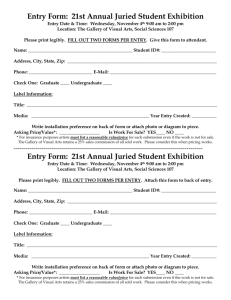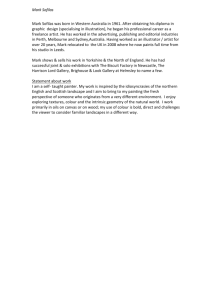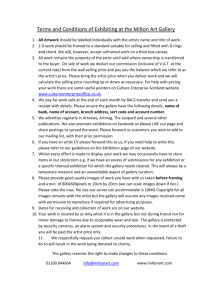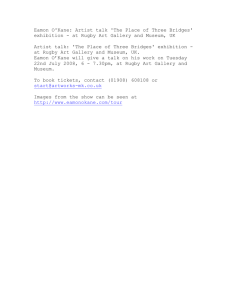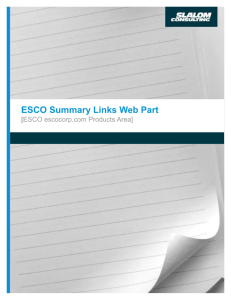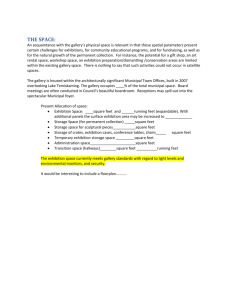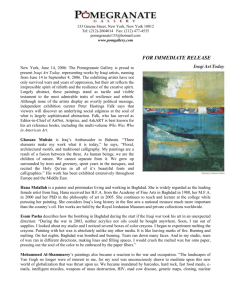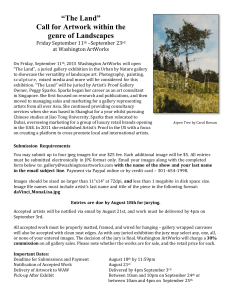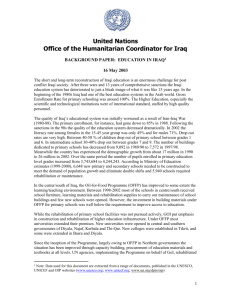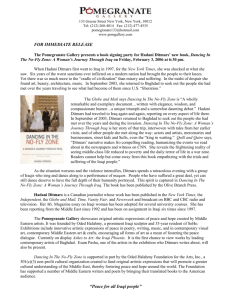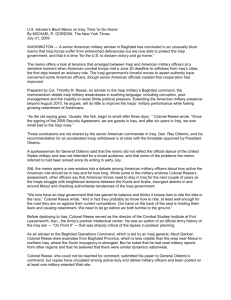Press Release (WORD DOC)
advertisement
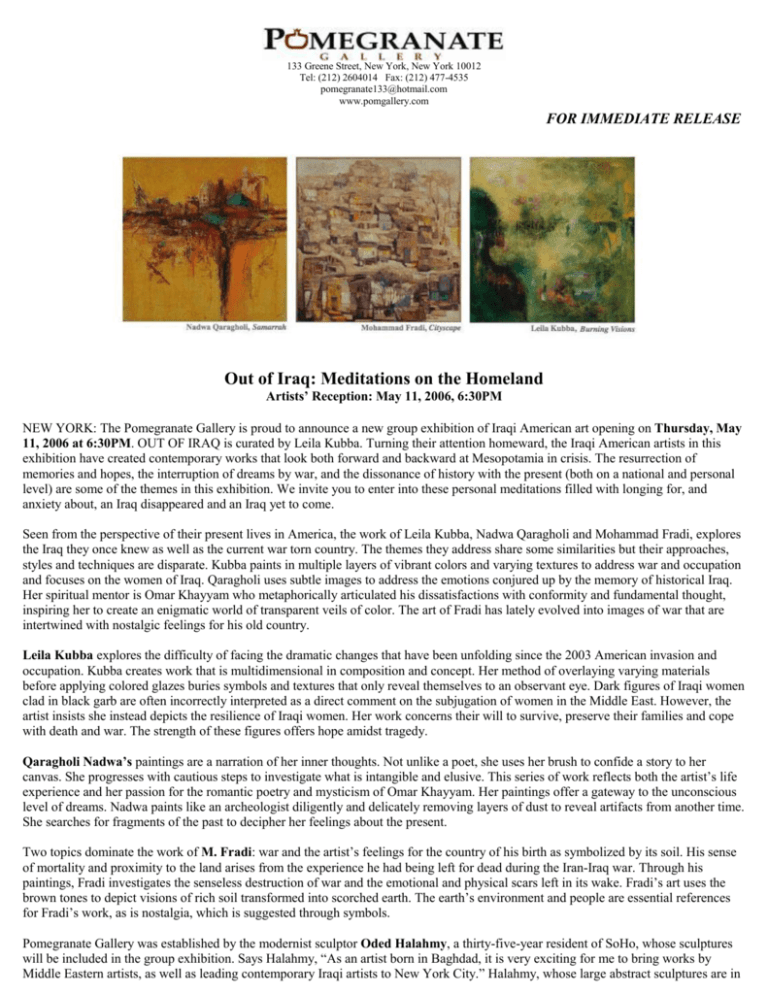
133 Greene Street, New York, New York 10012 Tel: (212) 2604014 Fax: (212) 477-4535 pomegranate133@hotmail.com www.pomgallery.com FOR IMMEDIATE RELEASE Out of Iraq: Meditations on the Homeland Artists’ Reception: May 11, 2006, 6:30PM NEW YORK: The Pomegranate Gallery is proud to announce a new group exhibition of Iraqi American art opening on Thursday, May 11, 2006 at 6:30PM. OUT OF IRAQ is curated by Leila Kubba. Turning their attention homeward, the Iraqi American artists in this exhibition have created contemporary works that look both forward and backward at Mesopotamia in crisis. The resurrection of memories and hopes, the interruption of dreams by war, and the dissonance of history with the present (both on a national and personal level) are some of the themes in this exhibition. We invite you to enter into these personal meditations filled with longing for, and anxiety about, an Iraq disappeared and an Iraq yet to come. Seen from the perspective of their present lives in America, the work of Leila Kubba, Nadwa Qaragholi and Mohammad Fradi, explores the Iraq they once knew as well as the current war torn country. The themes they address share some similarities but their approaches, styles and techniques are disparate. Kubba paints in multiple layers of vibrant colors and varying textures to address war and occupation and focuses on the women of Iraq. Qaragholi uses subtle images to address the emotions conjured up by the memory of historical Iraq. Her spiritual mentor is Omar Khayyam who metaphorically articulated his dissatisfactions with conformity and fundamental thought, inspiring her to create an enigmatic world of transparent veils of color. The art of Fradi has lately evolved into images of war that are intertwined with nostalgic feelings for his old country. Leila Kubba explores the difficulty of facing the dramatic changes that have been unfolding since the 2003 American invasion and occupation. Kubba creates work that is multidimensional in composition and concept. Her method of overlaying varying materials before applying colored glazes buries symbols and textures that only reveal themselves to an observant eye. Dark figures of Iraqi women clad in black garb are often incorrectly interpreted as a direct comment on the subjugation of women in the Middle East. However, the artist insists she instead depicts the resilience of Iraqi women. Her work concerns their will to survive, preserve their families and cope with death and war. The strength of these figures offers hope amidst tragedy. Qaragholi Nadwa’s paintings are a narration of her inner thoughts. Not unlike a poet, she uses her brush to confide a story to her canvas. She progresses with cautious steps to investigate what is intangible and elusive. This series of work reflects both the artist’s life experience and her passion for the romantic poetry and mysticism of Omar Khayyam. Her paintings offer a gateway to the unconscious level of dreams. Nadwa paints like an archeologist diligently and delicately removing layers of dust to reveal artifacts from another time. She searches for fragments of the past to decipher her feelings about the present. Two topics dominate the work of M. Fradi: war and the artist’s feelings for the country of his birth as symbolized by its soil. His sense of mortality and proximity to the land arises from the experience he had being left for dead during the Iran-Iraq war. Through his paintings, Fradi investigates the senseless destruction of war and the emotional and physical scars left in its wake. Fradi’s art uses the brown tones to depict visions of rich soil transformed into scorched earth. The earth’s environment and people are essential references for Fradi’s work, as is nostalgia, which is suggested through symbols. Pomegranate Gallery was established by the modernist sculptor Oded Halahmy, a thirty-five-year resident of SoHo, whose sculptures will be included in the group exhibition. Says Halahmy, “As an artist born in Baghdad, it is very exciting for me to bring works by Middle Eastern artists, as well as leading contemporary Iraqi artists to New York City.” Halahmy, whose large abstract sculptures are in numerous museums including the Guggenheim, the Hirschhorn, and the Israel Museum in Jerusalem — felt compelled to open a gallery that would introduce Americans to the serious artistic initiatives from the Middle East. He observes that Americans are not only becoming increasingly international in their art collecting, but hopes that his gallery will serve as a cultural ambassador to awaken American consciousness of Middle Eastern Art. In fact, Baghdad, the cradle of civilization, has historically been viewed as the cultural capitol of the Middle East and primary innovator in the fine arts. The gallery is supported in part by the Oded Halahmy Foundation for the Arts, a 501(c)(3) non-profit cultural organization created to fund original artistic expressions that promote a greater cultural understanding of the Middle East, thereby fostering peace and hope around the world. The Foundation has already supported a number of Middle Eastern writers and poets by bringing their translated works to an American audience. Contacts: Leila Kubba, leelee520@aol.com / Oded Halahmy, pomegranate133@hotmail.com.
